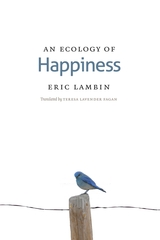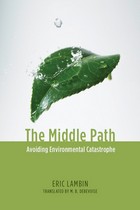2 books about Lambin, Eric

An Ecology of Happiness
Eric Lambin
University of Chicago Press, 2012
We know that our gas-guzzling cars are warming the planet, the pesticides and fertilizers from farms are turning rivers toxic, and the earth has run out of space for the mountains of unrecycled waste our daily consumption has left in its wake. We’ve heard copious accounts of our impact—as humans, as a society—on the natural world. But this is not a one-sided relationship. Lost in these dire and scolding accounts has been the impact on us and our well-being. You sense it while walking on a sandy beach, or in a wild, woody forest, or when you catch sight of wildlife, or even while gardening in your backyard. Could it be that the natural environment is an essential part of our happiness? Yes, says Eric Lambin emphatically in An Ecology of Happiness. Using a very different strategy in addressing environmental concerns, he asks us to consider that there may be no better reason to value and protect the health of the planet than for our own personal well-being.
In this clever and wide-ranging work, Lambin draws on new scientific evidence in the fields of geography, political ecology, environmental psychology, urban studies, and disease ecology, among others, to answer such questions as: To what extent do we need nature for our well-being? How does environmental degradation affect our happiness? What can be done to protect the environment and increase our well-being at the same time? Drawing on case studies from Asia, Africa, Europe, and North America, Lambin makes a persuasive case for the strong link between healthy ecosystems and happy humans.
Unique in its scope and evenhanded synthesis of research from many fields, An Ecology of Happiness offers a compelling human-centered argument that is impossible to overlook when we marvel at murmurations of starlings or seek out the most brilliant fall foliage: nature makes our steps a little lighter and our eyes a little brighter. What better reason to protect an ecosystem or save a species than for our own pleasure?
[more]

The Middle Path
Avoiding Environmental Catastrophe
Eric Lambin
University of Chicago Press, 2007
The debate about global warming is over. There is no longer any question that human activity is causing the Earth’s climate to heat up at an increasingly rapid rate, with consequences that we are now only beginning to understand. Meanwhile, human population growth is placing unsustainable demands on everything from animal habitats to water supplies. Faced with radically different assessments of the long-term effects of global warming—from oil companies, scientists, business lobbies, and environmental groups—concerned citizens find it difficult to tell how dire the prognosis really is. Is life on Earth doomed, or is there still time to mitigate—even to reverse—the damage that has already been done?
In The Middle Path, noted geographer Eric Lambin provides a concise, readable summary of the present state of the environment and considers what must be done if environmental catastrophe is to be avoided. Finding merit in the arguments of both optimists and pessimists, Lambin argues that it is not too late to exploit the inherent tendency toward equilibrium of large-scale systems such as the earth’s environment. By relying upon a combination of remedies as global as international cap-and-trade emission treaties and as local as municipal programs promoting the use of bicycles rather than cars, it may yet be possible to rescue humanity from a potentially fatal crisis of its own making.
Based on rigorous scientific analysis, and strikingly free of ideological prejudice, The Middle Path presents a fresh view of our troubled future, brilliantly balancing tough-minded realism with humanitarian ideals of cooperation and ingenuity.
In The Middle Path, noted geographer Eric Lambin provides a concise, readable summary of the present state of the environment and considers what must be done if environmental catastrophe is to be avoided. Finding merit in the arguments of both optimists and pessimists, Lambin argues that it is not too late to exploit the inherent tendency toward equilibrium of large-scale systems such as the earth’s environment. By relying upon a combination of remedies as global as international cap-and-trade emission treaties and as local as municipal programs promoting the use of bicycles rather than cars, it may yet be possible to rescue humanity from a potentially fatal crisis of its own making.
Based on rigorous scientific analysis, and strikingly free of ideological prejudice, The Middle Path presents a fresh view of our troubled future, brilliantly balancing tough-minded realism with humanitarian ideals of cooperation and ingenuity.
[more]
READERS
Browse our collection.
PUBLISHERS
See BiblioVault's publisher services.
STUDENT SERVICES
Files for college accessibility offices.
UChicago Accessibility Resources
home | accessibility | search | about | contact us
BiblioVault ® 2001 - 2024
The University of Chicago Press









